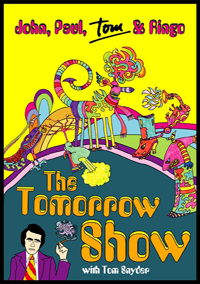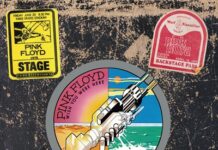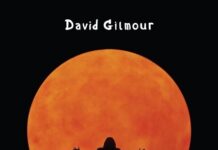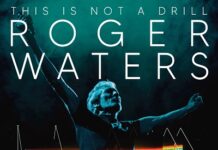Of all the rock and roll archival footage from the 60s, 70s and 80s, none
is more raw, rollicking and revealing than the hijinks that went on over at
NBC’s The Tomorrow Show with Tom Snyder. Unlike other talk show
mavericks like Mike Douglas and Dick Cavett, Snyder was a serious newsman and
journalist without the showbiz glitz. Watching his hard-hitting, unbiased interviewing
style, often one-on-one in a cloud of cigarette smoke, I’m reminded of
the day when television hosts and the occasional rock and roll guest were worlds
apart ideologically and philosophically. Nowadays, the talking heads invading
our television sets are primed-up Barbies and Kens who look great in their close-ups,
but lack the credentials or experience of a true reporter. And their interviews
are bottled and shipped like greased-up promos selling images and products,
not exploratory exposés that dig and probe for the truth. But I digress…
Snyder, who passed away from leukemia in 2007, may be best remembered for his
1975 interview with John Lennon, reportedly the last extended chat the former
Beatles ever gave for the television cameras. On December 9, 1980, the night
after Lennon’s untimely death, a large portion of the interview was repeated
on NBC, along with additional discussions with music journalist Lisa Robinson
and record producer Jack Douglas. This broadcast, plus other segments
featuring Paul McCartney and Ringo Starr, have been bundled together for a double
DVD feast called The Tomorrow Show With Tom Snyder: John, Paul, Tom
& Ringo.
At times, Snyder’s interviews with the former Fabs take on a more reverential
tone than his dalliances with the punks and the deadheads (there are DVDs available with
each). Sitting with Lennon, he asks succinct, sometimes truculent questions
about the Beatles, the music business and drugs, before bringing out Leon Wildes
(who represented Lennon and Yoko Ono in their battle to gain permanent residence
in the United States) to discuss Lennon’s immigration case. While there’s tons
of insight here (despite Snyder’s dry recollections), the thing that sticks
out in my mind at the end of the interview is what may have transpired had
Lennon lost his battle to remain in the States.
The exchange with Paul and Linda McCartney is less subservient, but filled
with many of the same questions when it comes to the Beatles and the years since.
Airing on December 20, 1979, the interview was conducted via satellite with
Snyder in New York and the McCartneys in London, preparing for a concert.
At the outset, Snyder keeps his guests waiting while he jokes around with the crew.
Then he plays a video for the Wings single “Spin It On” from Back
To The Egg before any dialogue is traded. McCartney seems mildly annoyed by the host’s demeanor while Linda makes faces and carefully
answers Snyder’s pointed inquiries. Eventually, Wings guitarists Denny
Laine and Laurence Juber get in a few words, but they certainly can’t
walk the talk of sheep and politics.
The final interview of the set is with Ringo Starr from November 25, 1981.
Filmed at the drummer’s makeshift pad in L.A., the show follows a Barbara
Walters-type format with Snyder relaxing on Starr’s couch in a
polo shirt and khakis and making small talk. Ringo speaks at length about his
new album at the time Stop And Smell The Roses. A video for
“Wrack My Brain” gets a preview before Snyder gets heavy
and asks about Starr’s film work and relationship with John Lennon. Barbara
Bach joins in, and the conversation becomes congenial and polite. It’s easy
to see that, as the years went by, Snyder softened his image and loosened up.
The bonus interview with Angie Dickenson reaffirms this assumption, but does
little else to add to this intriguing package. I can only guess George Harrison
and Tom Snyder never crossed paths to make it a complete “reunion.”
Still, three out of four ain’t bad.
~ Shawn Perry




















